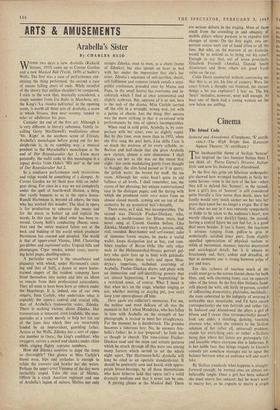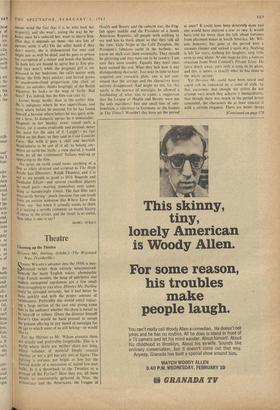Cinema
The Island Code Seduced and Abandoned. (Cinephone; 'X' certifi- cate.)--The High Bright Sun. (Leicester Square Theatre; 'A' certificate.) THE inexhaustible theme of Sicilian 'honour' has inspired the two funniest Italian films I can think of : Pietro Germi's Divorce, Italian- Style and now his Seduced and Abandoned.
In the first this grim yet hilarious anthropolo- gist showed how wronged husbands in Sicily be- come heroes—even in the eyes of the law—when they kill to defend this `honour'; in the second, how a girl's loss of 'honour' is still considered quite literally a fate worse than death, since her family would very much sooner see her into her grave than know her no longer a virgin. But if the first, since no one in it was remotely sympathetic or liable to be taken to the audience's heart, was merely (though very darkly) funny, the second, having a central figure we can feel for, is a good deal more besides. It too is funny, the reactions it arouses ranging from guffaw to grin to esthetically satisfied inner purr, from slightly appalled appreciation of physical realism to relish of movement, manner, interior decoration and sociological detail; but it is almost as ferociously sad, fiery, ardent and dreadful, so that at moments one is strung between yelps of joy and tears.
For this richness of reaction much of the credit must go to the actress Germi chose for both films, and, with charming irony, cast on opposite sides of the fence. In the first film Stefania Sand- relli played the wife, old Sicily in-person, symbol of suffocating domesticity, platitudes, mothballs: she even submitted to the indignity of wearing a noticeable neat moustache, and I'd have sworn (retrospectively) she was fortyish and rather fat. In Seduced and Abandoned she plays a girl of fifteen and I swear (less retrospectively) doesn't look any older, a dazzling, dashing, touching creature who, while she submits to the Sicilian solution of her (after all, universal) problem, stands for everything anti- or rather a-Sicilian, being thin where her 'sisters are grotesquely fat, and loveable where everyone else is ludicrous. It is her noble face that brings tragedy to Germi's comedy yet somehow manages not to upset the balance between what an audience will and won't take.
By Sicilian standards what happens is straight- forward enough; by normal ones an almost un- believable tangle. Once a girl has been seduced she must marry her seducer; but he won't want to marry her, as he expects to marry a virgin
(never mind the fact that it is he who took her virginity), and she won't, seeing the way he be- haves once he's seduced her, want to marry him. (Not that it depends on them—the two lots of Parents settle it all.) On the other hand if they don't marry, she is dishonoured for ever and might just as well be dead, and he goes to prison for corruption of a minor and much else besides. So both lots are bound to agree but at first pre- tend they won't, while the pregnant girl is im- prisoned in her bedroom, the cafés quiver with gossip, the little boys snicker, and hatred grows to mushroom-cloud proportions (the chief of Police. an outsider, thinks longingly of the Bomb whenever he looks at the map of Sicily. Bad taste'? Yes indeed, but the film can take it).
Germi bangs harder than in the earlier film. He is indignant where he was supercilious, and cares where before he sneered, for he has found himself a heroine where before he was quite with- out a hero. At domestic uproar he is unbeatable: Magnani in her heyday never raised such a racket, yet it seems creditable and pointed. never lust noise for the sake of it. Laugh'?— we fair rolled on the floor, as they said in Cold Conn/Orr Farm. But with it goes a chill and heartfelt thankfulness to be out.of it all. to belong any- Where on earth but Sicily; a view shared. it would seem, by all the 'continental' Italians making or appearing in the film.
No actor on earth could make anything of a film as vilely directed and scripted as The High Bright Sun (Director: Ralph Thomas), and it is sad to see people as good as Dirk Bogarde and Penhohn Elliott--and several excellent players In small parts—wasting themselves over some- thing so nauseatingly trivial. The bad film isn't necessarily boring—much innocent fun can result from an outsize nonsense like Where Love Has Cone, say— but when it actually seems to think It is making a sericitis comment on recent history (CYPrus in the crisis), and the result is as awful, then what is one to say?
ISABF.L QUIGLY



































 Previous page
Previous page